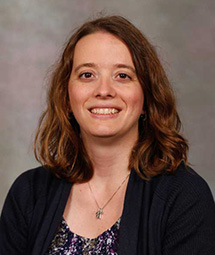Foundation Award for Research

Dr. Amy Hulme
School of Health Sciences- Biomedical Sciences
McQueary College of Health and Human Services
I. Focus of Research
My research focuses on Human Immunodeficiency Virus (HIV) infection which can develop into acquired immunodeficiency syndrome (AIDS). Currently, there are 39.9 million people worldwide living with HIV and an estimated 42.3 million people have died from AIDS. To develop a vaccine, cure, or new treatments it is important to understand the fundamental biology of how HIV infects cells to cause disease. Viruses also do not contain all the components needed for infection and will borrow factors from the cells they infect. In my lab at MSU, we study how these cellular factors mediate the HIV replication process in microglial cells, a natural target of HIV infection. Using a combination of genetics, cell biology, and fluorescence microscopy techniques, we have been studying the role of the cellular factors Cyclophilin A and SPTBN1 on the early replication steps of uncoating, reverse transcription, and nuclear import. Determining how Cyclophilin A and SPTBN1 function in viral replication will increase our understanding of the basic biology of HIV.
II. Major Projects
- Characterization of HIV uncoating in microglial cells, 2016-2020
- Overlap Intensity: An ImageJ macro for analyzing microscopy data, 2018-2021
- COVID-19 wastewater testing at MSU, 2020-2022
- Role of Cyclophilin A in HIV replication, 2017-ongoing
- Role of SPTBN1 in HIV replication, 2019-ongoing
III. Future Directions of Research
Research is ongoing to understand the roles of Cyclophilin A and SPTBN1 in early steps of HIV replication. Cellular factors that mediate virus intracellular trafficking are also involved in these replication steps, so future directions involve determining how Cyclophilin A and SPTBN1 may interact with these other cellular factors.
IV. Topics related to your research and of interest to the broad University Community, for which you are available for presentations and/or consultations.
- HIV and AIDS pandemic- treatments, cure, vaccines, prevention, education, etc.
- Health Equity
- Virology
- Human Genetics